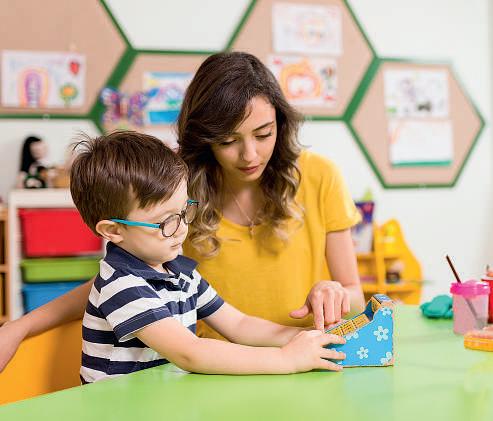
14 minute read
Helping children with DME
FEATURE / 43 ➜ SPOTLIGHT
I
n 2016 when the charity Potential Plus UK (PPUK) asked me to provide training to their parent members on how to help their children with sensory processing difficulties, I assumed it would just be like all the other training events I’ve given on the topic. In a way it was. The training went off without a hitch, but the process taught me several things that have informed my work since then.
A paediatric occupational therapist’s (OT) main goal is to help children overcome barriers to become as independent and efficient as possible in carrying out their tasks. These tasks can vary widely from everyday activities such as writing legibly or being able to concentrate in class to basic skills such as playing football with their friends. The barriers could be anything from difficulties coping with noise, light and touch, hyperactivity, an intense need for movement, difficulties with handwriting, to extreme emotional reactions if things do not go the way they perceive it should.
After providing the training for PPUK, I began to work with children with High Learning Potential (HLP) and DME on a oneto-one basis. The parents were confused and frustrated that their children were struggling to reach their academic potential despite their high cognitive ability, or that their children had a hard time making and
Helping children n with DME Helping children who have high learning potential and SEND, or Dual or Multiple Exceptionality (DME), taught Occupational Therapist Mariza Ferreira some key lessons. Here, she outlines her journey and shares some insights to help families and professionals offer effective support.

44 / FEATURE ➜ SPOTLIGHT


keeping friends, despite th heir immense creativity when it came to playing games.
Of course, there are many reasons why children struggle and not all of these can be addressed by occupational therapy, but some can. In my experience, children with DME typically struggle with sensory processing difficulties (SPD) and motor coordination skills. I found that the majority of the children with DME that I work with choose to work on developing management strategies for their SPD, as it causes them the most distress and is often the biggest barrier to their learning. The areas of SPD they struggle with are overreacting to everyday sensory input and displaying an increased and intense need for physical movement.



Several issues became apparent as I worked with the children. Firstly, the unique profiles of children with HLP or high cognitive ability and DME could be masking their SEND, or the other way round. Secondly, using the term DME to describe their particular neurodivergent makeup helped ensure I could accommodate their SEND and support the development of their HLP.
Thirdly, as a therapist I needed to adapt my standard treatment approaches and techniques to be effective. For instance, repeating concepts learnt in previous sessions is almost a sure way to ‘lose’ a child with DME. They quickly told me, whether by their words or sudden defiant behaviour, that they ‘got it the first time round’ and would rather like me to help them expand and explore the concept further!
My mission is to ‘change the world one child at a time’ and I’m not alone in this ambition. I was able to secure grants
BIO
M A R I Z A F E R R E I R A
Mariza is an independent specialist children’s Occupational Therapist, who runs The OT Company. Mariza has a particular interest in working with children who have high learning potential and dual or multiple exceptionality and received the Above and Beyond Inspirational Therapist Award in 2019 for her work in this area. Discover more about her work by visiting her website
www.theotcompany.com
to enable me to deliver courses to other occupational therapists on how to treat children with HLP and DME in collaboration with PPUK, and I have also created online courses for parents of HLP and DME children on how to help their children on a daily basis. These courses focus on how parents can help children cope with noise or manage their sensory processing difficulties and they are also suitable for SENCOs; the theory and all the strategies are transferable and easy to implement within the school environment.
If you are interested in learning more about helping children with DME who also have SPD, then you can access the course ‘How to help your gifted child with sensory issues cope in real life’ at https://bit.ly/3FElKcu Use the code ‘nasen2022’ to get a 20 per cent discount if you enrol in January or February 2022.
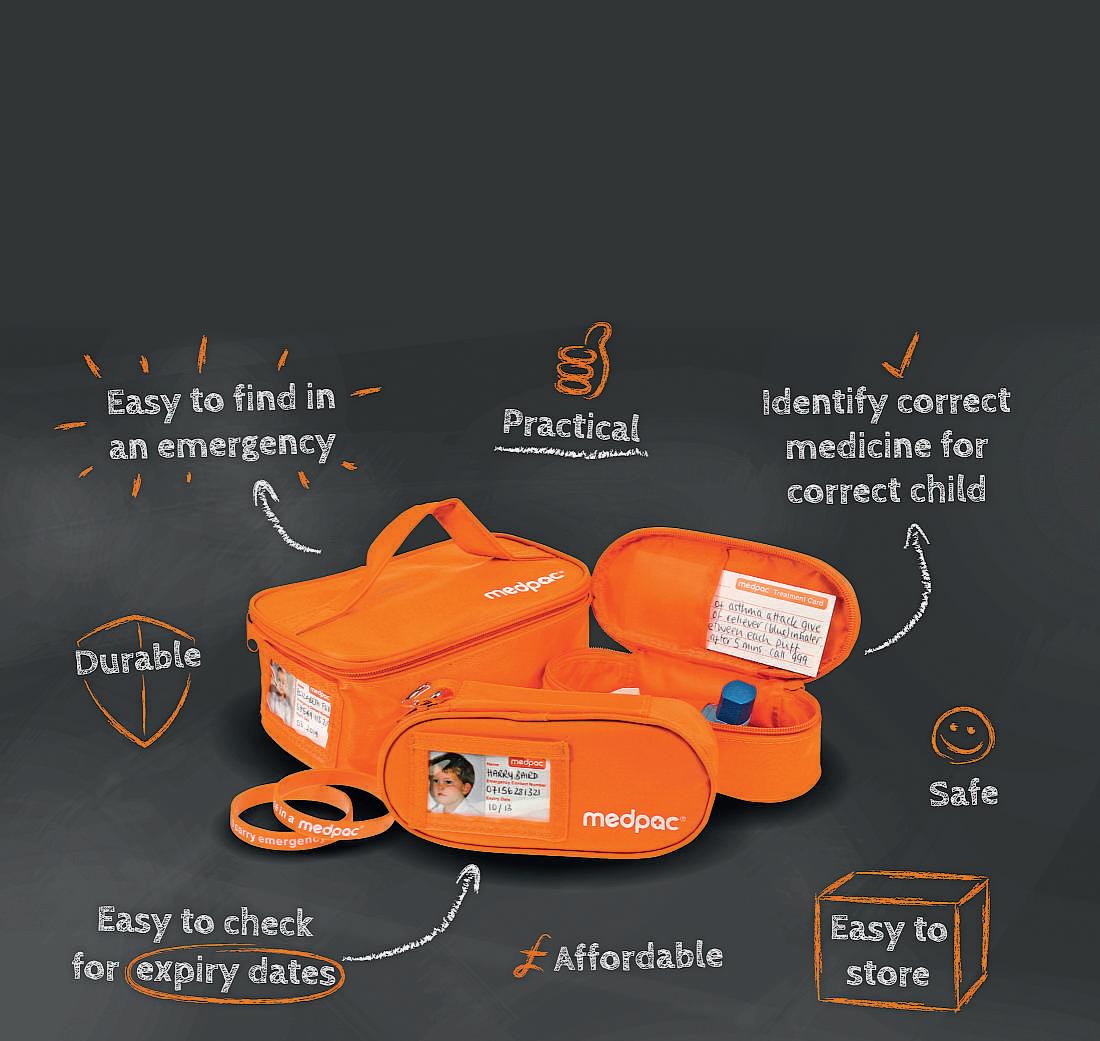
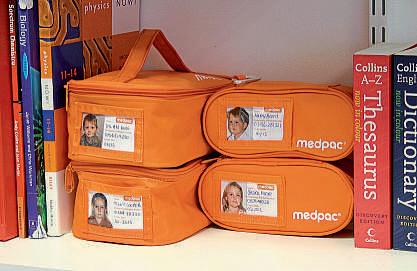


Ask theteam
There is always a steady stream of questions arriving at nasen House and, of course, the Education Team answers them as soon as possible. But, while many of them are specific to a particular context, the answers to a number of them could be helpful to the wider nasen membership. ‘Ask the team’, formerly ‘Connect with Us’, provides the space to share these questions and answers.
nasenconnect@nasen.org.uk 01827 311500 @nasen_org search: @nasen.org
If you have a question, and think the answer would be useful to everyone, please submit it to nasenconnect@nasen.org.uk Of course, you can always give nasen House a call too.

HANDWRITING INTERVENTION
There has been a rise in our secondary school teachers demanding pupils have intervention for their handwriting, especially since September and the return to full subject teaching. These pupils are not on the SEN register, have not had an issue prior to the lockdowns and it is only certain subjects that are seemingly an issue. Is there a specific intervention that we could use across years 7 to 10?
Secondary SENCO, Walsall
Handwriting could become a lost art across the world with the advent of so many technological advances. In the future we probably won’t even type as we will simply speak our answers into the computer! As for the pupils you are referring to, this is taken from the JCQ Access Arrangements for 2022 (https://bit.ly/3owVURm): “A candidate does not have a learning difficulty but is a ‘messy’ writer. His handwriting is hard to decipher. He requests the use of a word processor. This is granted by the SENCO because it reflects his normal way of working within the centre.” If this is the student’s normal way of working, evidence will be needed to prove this and there will need to be a statement from a member of the senior leadership team as to the criteria that has been used to allocate word processors for examinations.
A POSITIVE CLASSROOM ENVIRONMENT
I have been reading research around the impact of an over-stimulating environment on some children’s ability to learn. Are there any resources you can point me towards to support changing my classroom environment? My headteacher wants all classes to have lots of displays and working walls and I feel this is not working for a certain number of pupils in my class.
Primary teacher, Plymouth
This is an interesting area of research that has gained momentum as the number of diagnoses of autism increases, along with awareness of the way the environment has a sensory impact. There are a number of resources that can provide evidence and support for the changes to your environment on a sensory needs basis. It could provide an excellent topic for you to use as evidence for our nasen Recognised Teacher of SEND course. Find out more at: https://bit.ly/2YLfyjw
TECHNOLOGY SUPPORT
Since the pandemic our pupils have got more accustomed to using technology and we want to encourage this whilst also providing them with the tools to support them best. Can you point me to the best apps or software to support reasonable adjustments such as reading aloud or changing backgrounds to help visual stress, etc.?
Special School SENCO, Warrington
In the recent past, additional software or programmes were the way to go for these accessibility features, though the tech giants have got wise and realised that these should be provided as standard. There are therefore a large number of accessibility features available in software that we commonly use. nasen hosted a free webinar on the accessibility tools available in Microsoft 365 (https://bit.ly/3cdBvLf) and if you contacted your local EdTech demonstrator school (https://bit.ly/2YNyChf) they may be able to support across other programmes.
DYSCALCULIA TRAITS
We have several students who are showing possible dyscalculia traits. Is there a simple screener we can use for all pupils to check areas that they may be having difficulties with?
Primary SENCO, Stafford
IDL, the winner of the 2021 nasen award for technology, currently has a dyscalculia screener (https://bit.ly/3Hzrwyz) that is free of charge to all schools. The screener is an online test that takes around 15 minutes to complete and can be used for an entire year group or a particular individual that you may believe has an area of difficulty or dyscalculia.
It may also be that the young people are having difficulties due to some missed learning during the past two years of disruption, and it would be looking at the high-quality teaching approach with concrete materials to support this as the first intervention.
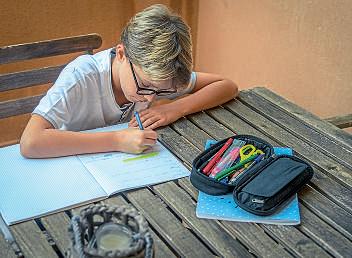



Reviews
INCLUSION – A PRINCIPLED GUIDE FOR SCHOOL LEADERS
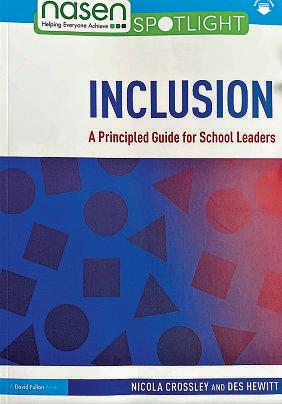
I
nclusion is one of those terms that has been around education since the Warnock report back in 1978. The term ‘inclusion’ is unusual in that it can often mean different things to different people and this book seeks to identify the commonalities in various viewpoints and present the different aspects that can make up the components to becoming an inclusive school.
The layout of this book enables the reader to take each chapter on its own or to read the whole book. It provides the key themes and evidence and builds in reflection points for you to examine your current practice. Clearly articulated within each chapter is the moral responsibility that school leaders have to frame the education that they provide within the right values and practices. One of the standout sentences on inclusive values is ‘If we disagree with the school system we have, then it is our responsibility to change it’.
We know that exclusions remain high in England and that there are groups that are disproportionately affected by this. Within the book there are specific chapters looking at SEND, socio-economic disadvantage, culture, language and ethnicity and the more able, which offer the reader further insight into how best to engage these learners and their families
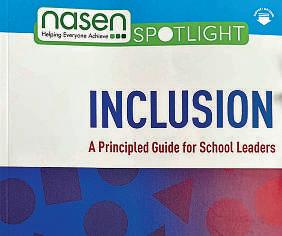
Author:
Nicola Crossley and Des Hewitt Publisher: Routledge ISBN: 9780367345280 Price: £22.99 Reviewed by: Zoe Mather, Education Officer at nasen
with school and learning. Every school has a level of inclusion, and I would recommend this guide to any leader who wants to reflect upon how they can develop their inclusivity further.
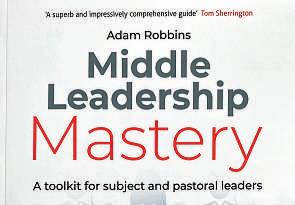
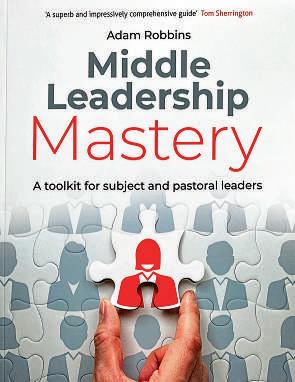
Author: Adam Robbins
Publisher:
Crown House Publishing Limited ISBN: 978-178583534-6 Price: £16.99 Reviewed by: Andy Smyth, Key Stage 4 Lead, Beverley School, Middlesbrough
MIDDLE LEADERSHIP MASTERY
Middle Leadership Mastery provides a good overview of middle leadership with a mixture of theory and practical examples to support existing middle leaders or people that wish to move into such a role. The book is split into nine chapters and is equally useful being read cover to cover or being dipped into, depending on the area of interest.
There are some real gems in here. The chapter on curriculum is extremely useful. It is here that an early example of Robbins’ pragmatism can be noted; he speaks regularly of ‘opportunity cost’, the idea that when focusing on one thing, inevitably, something else is not being done. This is one of the most pressing issues as a middle leader. The chapters on teaching and learning and on leading others are also invaluable and give much practical help. The cognitive science tables with their implications for teachers and the table of routines were notably insightful in the former and the analogy of the elephant, the rider and the path valuable in the latter.
Unfortunately, the quality of the chapters is not maintained throughout and there are some missed opportunities. There is very little focus on SEND and, whilst there are theoretical and ethical questions raised that could lead the reader to consider this area, this is a regrettable omission. Middle Leadership Mastery is a thought-provoking read, with excellent links to research and theory, and a worthy publication. It would be suitable for those already in post and gives an excellent introduction for those wishing to pursue a role at this level in the future.







EventsDiary
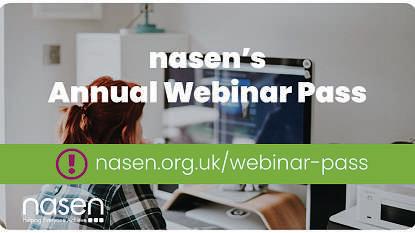
nasen webinars For the full programme and for details of the Webinar Pass, please visit https://bit.ly/3zImMSA
Making Participation Work – Practitioners Conference 25 January, 10am – 1pm As part of the Department for Education (DfE)-funded Making Participation Work programme, the Council for Disabled Children is delivering a practitioners conference. To find out more, visit https://bit.ly/3GEHx4N
SEND Conference 2022
Online, 26th April 2022, 9am – 5pm Join SEND experts at the SEND Conference 2022 to hear the latest updates on policy and guidance for supporting pupils with SEND. Visit: https://bit.ly/3FYemJy or call 0330 0584 285.
Nursery World Show: Supporting the Future of Early Years
29-30 April 2022 The Business Design Centre, 52 Upper Street, London, N1 0QH Visit: www.nurseryworldshow.com/
nasen Live 2022 –‘Inclusion by Design’ 15 July 2022, 9.30am – 4:30pm One-day conference with complimentary lunch enabling delegates to share SEND best practice and network faceto-face with colleagues. Attendees can also enjoy a variety of CPD seminars from sector-leading speakers. Early Bird offer: £79 until 31 March 2022 To book, visit: https://bit.ly/3I3lV3K
nasen Early Years
nasen’s national seminar –The Constant Gardener 1 March 2022, 9.30am – 12.30pm DfE funded, free to attend for local authority early years and SEND teams. To book, visit: https://bit.ly/3I13e0l
nasen Early Years
Meeting the Needs of Every Child 16 March 2022, 6pm – 8pm This DfE-funded, free two-hour live webinar is for early years practitioners in PVI settings, including childminders. To book, visit: https://bit.ly/3nZyQeW
Whole School SEND
Beyond the School Gates: Exploring Opportunity and Aspiration into FE and Beyond
Online webinar series* Part 1: 19 January 2022 available via SEND gateway: https://bit.ly/3DGabjZ. Part 2: 2 Feb February 2022, 3.45pm – 5pm. Part 3: 23 February 2022, 3.45pm – 5pm. To book, visit: https://bit.ly/3E4mEPv
Whole School SEND
New to the SENCO Role: Understanding the role of the SENCO within a context of distributed leadership
Online webinar series* Part 1: Recording and materials available (along with pre-reading for part 2). Part 2: 20 January 2022, 2pm – 3.30pm Part 3: 10 February 2022, 2pm – 3.30pm To book, visit: https://bit.ly/3cWn8eR
Whole School SEND
Perfecting Preparation for Adulthood Online webinar series* Part 1: Thursday 10 February 2022, 4pm–5.30pm – The Universal PfA Offer Part 2: Thursday 3 March 2022, 4pm–5.30pm – The Targeted PfA Offer Part 3: Thursday 17 March 2022, 4pm–5.30pm –The Specialist PfA Offer To book, visit: https://bit.ly/3cZCsHG





















